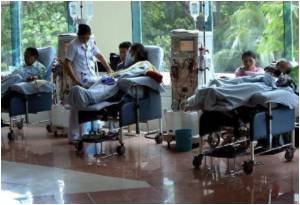To identify failing kidneys in people with diabetic kidney disease, a new study states, a morning urine test can be helpful.

Dr. Hiddo Lambers Heerspink, PharmD, (University Medical Center Groningen, in the Netherlands) and his colleagues assessed and compared the ability of various proteinuria measures, including proteinuria versus albuminuria and 24-hours versus early morning sampling, to predict worsening kidney problems.
Albuminuria, a large component of proteinuria, is more specific than total proteinuria and is defined as an excess amount of albumin in the urine.
Amongst the samples - urinary protein from a 24-hour urine collection, urinary albumin from 24-hour and morning sample collection - the team found that measuring the albumin:creatinine ratio in a first morning urine sample was the superior method to predict kidney problems in patients with type 2 diabetes and kidney disease.
The authors noted that standardizing proteinuria measures would improve methods for detecting and monitoring kidney disease.
The study appears in an upcoming issue of the Journal of the American Society Nephrology (JASN).
 MEDINDIA
MEDINDIA




 Email
Email










